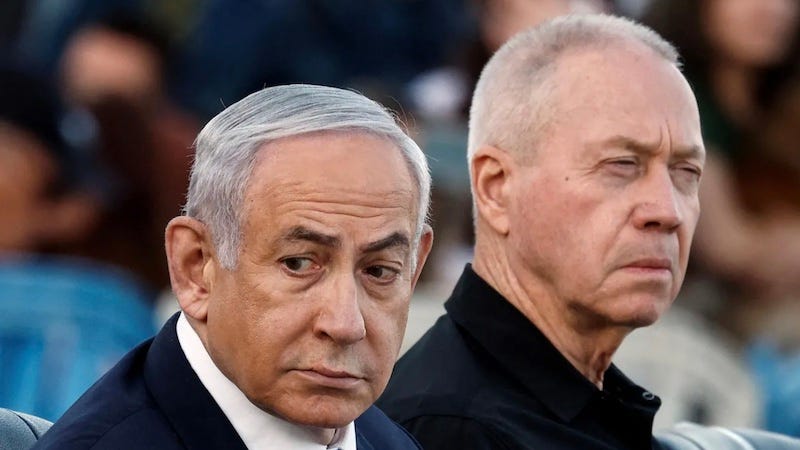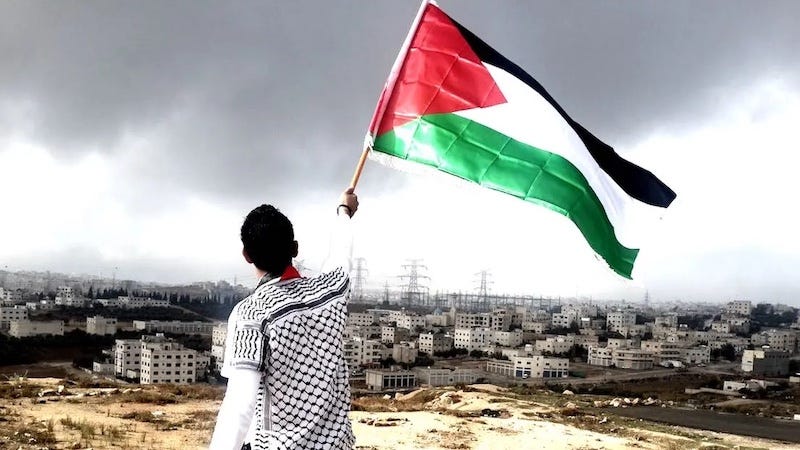Netanyahu arrest warrant could see a rapid change in Palestine
History teaches us that when change does come, it is often swift and unexpected.
The arrest warrant issued by the International Criminal Court for Israeli Prime Minister Benjamin Netanyahu over alleged war crimes in Gaza has cast a spotlight on international justice and the geopolitical issues that arise when principles of law collide with political alliances. This decision by the ICC has prompted a debate in Australia which, of course, has fallen along predictable party lines.
Foreign Minister Senator Penny Wong has emphasised Australia’s respect for the ICC’s independence and its role in upholding international law and pointed to the principle that adherence to international law is not only a moral obligation but also serves Australia’s strategic interests. This stance aligns with the broader framework of ensuring accountability for war crimes and maintaining Australia’s credibility as a nation committed to international norms.
The Liberal Party Senator Michaelia Cash, has fiercely criticised the ICC’s decision – her response is based on two key points: alignment with the United States’ unequivocal rejection of the arrest warrant and an assertion that there is no moral equivalence between the actions of Israeli leaders and those of Hamas. Cash also raised the possibility of Australia re-evaluating its membership in the ICC, suggesting the court’s actions as ‘overreach’ that jeopardises key international alliances. This reaction not only mirrors the stance of the United States but also reveals a deeper discomfort within certain conservative circles about the ICC’s perceived bias and its focus on allies of the West.
However, such arguments sidestep Australia’s historical commitment to the ICC, a commitment that began under the conservative Howard government in 2002. The court’s role in prosecuting war criminals from regions such as the former Yugoslavia, Rwanda, and Sudan highlights its importance in delivering justice for atrocities and crimes against humanity. Calls to abandon the ICC now, when its focus shifts to leaders such as Netanyahu, just for the reasons of political convenience, risk undermining the credibility of a system designed to be impartial and universal.
This tension also exposes a deeper inconsistency in the Liberal Party’s rhetoric. By selectively opposing ICC actions, critics appear to condone a double standard: one set of rules for Western-aligned states and another for less powerful nations. This selective application of justice parallels historical attitudes where marginalised groups and weaker states are subjected to the full force of law, while powerful nations or their allies are shielded from scrutiny.
In the unlikely event that Australia did withdraw from the ICC, it risks diminishing its influence in shaping global norms of justice and accountability. Such a withdrawal would align Australia with nations that reject the ICC’s authority, often for reasons rooted in their own leaders’ potential culpability for crimes against humanity.
Netanyahu’s position as Israel’s leader is itself precarious. The ICC’s warrant adds to the mounting pressures he faces domestically and internationally. His political survival increasingly hinges on maintaining power, as stepping down could expose him to a wide range of legal consequences. This fragility reflects a broader crisis for Israel as a state dealing with its atrocious policies toward Palestinians, its strained relationships with neighbouring countries, and its dependence on diminishing American support.
Netanyahu’s tired old trope of anti-Semitism
Netanyahu’s framing of the ICC’s arrest warrant as an ‘anti-Semitic’ conspiracy follows a well-trodden path of deflection and politicisation. His claim that the court’s actions constitute a “modern Dreyfus trial” not only misrepresents the principles of international law but also weaponises historical anti-Semitism to shield himself from accountability, a narrative which exploits the legitimate sensitivities surrounding Jewish history and identity while ignoring the substantive legal basis of the charges against him.
At its core, the ICC’s decision is not about Israel’s identity as a Jewish state but about the actions of its leadership, particularly Netanyahu’s alleged role in policies and military operations that have led to widespread civilian deaths and suffering in Gaza. Over 45,000 Palestinians, two-thirds of them women and children, have lost their lives in conflicts where Israeli military strategies have been criticised – and documented – for their disproportionality, the targeting of civilian infrastructure, and the enforcement of a blockade that amounts to collective punishment. These actions are not protected under international law, nor are they beyond scrutiny simply because they are carried out by a allied nation-state.
Netanyahu’s characterisation of the ICC as biased or ‘rogue’ fails when examined alongside the court’s broader record. The ICC has a history of prosecuting leaders and military figures from diverse backgrounds, including those from African nations and the former Yugoslavia. These cases were not dismissed as discriminatory by the international community; they were widely seen as necessary steps in holding individuals accountable for crimes against humanity. The same standard must apply to Netanyahu, whose actions as a head of state do not grant him immunity from international law.
Netanyahu’s refusal to engage with the ICC also shows his lack of confidence in his own defence: if he truly believes in his innocence, as he has repeatedly asserted, the appropriate course of action would be to appear before the court, present evidence, and allow an impartial legal process to determine the truth. The fact that he has chosen to attack the court’s legitimacy suggests guilt rather than innocence, and it also speaks to the overwhelming evidence that has been documented, not only by independent investigations but also by members of the Israeli Defense Forces themselves, whose actions have been recorded and disseminated globally.
The argument that the ICC has suddenly become biased is particularly disingenuous given its previous broad acceptance. There were no significant objections when the court pursued cases against African leaders or officials in former Yugoslavia – Slobodan Milosević, Ratko Mladić and Radovan Karadžić – nor when it issued arrest warrants for Russian figures such as Vladimir Putin. The principle of universal accountability is the foundation of the ICC’s legitimacy, and to abandon this principle now, in the face of highly credible allegations against Netanyahu, is to render that legitimacy meaningless.
Global pressure will lead to a rapid transformation in Palestine
The trajectory of Israel–Palestine relations, long characterised by stagnation and regression – while it might not seem evident at this stage – now appears poised on the edge of transformative change. While the situation in Palestine has been marked by decades of entrenched oppression, there is reason to believe that the international and economic pressures bearing down on Israel may finally bring about a long-overdue and positive change.
This arrest warrant for Netanyahu is emblematic of this growing pressure. It signals a shift in global attitudes and a willingness to hold Israel accountable for its actions, actions that have increasingly defined it as a pariah state. The comparison to apartheid-era South Africa is not hyperbolic; Israel’s policies in the Occupied Palestinian Territories – ranging from blockades and forced displacements to a system of de facto segregation – mirror the systemic injustices that South Africa once institutionalised. The parallels are not lost on the global community, which is beginning to coalesce around the necessity of change.
This momentum has been bolstered by diplomatic shifts, such as Australia’s recent vote at the United Nations to demand an end to Israel’s unlawful presence in the Occupied Territories. For the first time in over two decades, Australia has aligned itself with 156 other countries in supporting a resolution that unequivocally calls for justice and peace. This is a significant departure from its historically cautious stance, particularly given the influence of Israel’s staunchest ally, the United States, and reflects a growing recognition that Australia has a responsibility to support international efforts toward ending the cycle of violence and advancing the two-state solution, efforts which have, so far, been lacking and highly supportive of the actions of Israel.
Economic factors further amplify these pressures. Just like apartheid South Africa and the Eastern Bloc, Israel faces mounting economic vulnerabilities exacerbated by its prolonged occupation and military aggressions. While it does seem that the state of Israel has an endless supply of military and financial support from the United States, the financial toll of maintaining such policies, coupled with increasing isolation from significant segments of the international community, threatens to undermine its economic stability. As history has shown, economic collapse often serves as a catalyst for political change, forcing regimes to confront their untenable positions.
Netanyahu himself symbolises the fragility of Israel’s current trajectory. His political survival hinges on maintaining power, not merely to enforce his hardline policies but to evade the legal consequences that await him. His indictment by the ICC serves as both a personal and political crisis, further destabilising a leadership already on precarious ground, and a leadership that is not worth supporting. As with other historical figures whose tenure ended in ignominy, Netanyahu’s eventual will become a turning point for Israel, paving the way for a more just and equitable future.
However, the path to resolution remains fraught with challenges. Ceasefires, such as the one recently established between Israel and Lebanon, offer a temporary reprieve but fail to address the deeper, systemic injustices that fuel the conflict. The situation in Palestine, where millions endure daily violations of their human rights, remains the most pressing and unresolved issue. While international consensus is increasingly aligned against Israel’s policies, meaningful change will require sustained pressure, coordinated diplomacy, and a genuine commitment to justice.
Australia’s renewed engagement at the United Nations on Palestine – although we’re yet to understand how long this will continue for – highlights the importance of collective action. While Australia alone cannot significantly influence the Middle East, its willingness to vote for resolutions that contribute to peace reflects a shift in priorities and an acknowledgment of the broader moral and political stakes.
History teaches us that when change does come, it is often swift and unexpected, although in hindsight, it always appeared inevitable. The end of apartheid in South Africa, once considered improbable, came rapidly after decades of international isolation and internal resistance. The fall of the Berlin Wall in 1989 and the collapse of communism in Eastern Europe were similarly unforeseen, yet they reshaped the world in profound ways. Israel and Palestine, though mired in decades of conflict, could likewise experience a dramatic and positive transformation. This is not naïve idealism or foolish speculation: when that moment arrives, it will be the result of years of sustained pressure, growing international condemnation, and the undeniable reality that the current status quo is unsustainable.
The mechanisms for change – economic instability, legal accountability, and international moral clarity – are already in motion. While the timeline remains uncertain, the inevitability of change is clear. For Israel to survive as a legitimate and democratic state, and for Palestine to achieve its rightful independence, autonomy and justice, the world must continue to press forward, united in purpose and unwavering in the pursuit of peace and justice.










